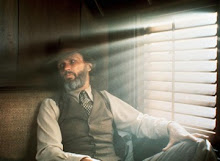"Heaven's Gate" is the story of James Averill (Kris Kristofferson), an 1870 Harvard graduate from a wealthy family who turns his back on a life of privilege to seek his fortune in the wild west. In 1892, after a stint as a cattleman, Averill becomes a peace officer in the town of Heaven's Gate, Wyoming. There he watches over an ever increasing melting pot populated by immigrants from myriad countries and ethnicities, mostly eastern European. Most of these immigrants have come to America, and the west, with little to start with and some resort to rustling a head or two of cattle to get by.
Averill lives a complicated life, romancing the town "madam" Ella (Isabella Huppert) who is also being courted, and paid, by the Cattlemen's Association enforcer Nate Champion (Christopher Walken) who happens to be a friend of Averill's.
The Cattlemen's Association, led by cattle baron Frank Canton (Sam Waterston), is growing increasingly resentful of the intrusion of the immigrants and their rustling. The local courts, sympathetic to the immigrants' plight, has recently set a number of rustlers free, further aggrivating the Cattlemen. Canton devises a plan to label the immigrants as anarchists, playing on the fears and prejudices of the locals. The Cattlemen compile a list of local immigrants who they feel need to be punished for their thievery; punished with a death sentence. To achieve this, they hire an army of gunslingers paid to kill.
Averill learns of the plot, and Ella's inclusion on the list for accepting Association cattle for "services rendered". Averill accuses Champion of knowing of this while he has seduced Ella. Champion pleads ignorance of the plot and seeks out Canton to learn the truth. Seeing the plan in action, Champion quits the Association. Canton and his army simply add Champion to the death list.
En route to Heaven's Gate Canton's army encounters Champion at his cabin. After a valiant fight, Champion is riddled with bullets when a fire forces him out of his cabin.
Canton's army moves ahead for Heaven's Gate. Meanwhile the citizens of the town have also learned of the vigilantes on their way to kill them. After a heated town hall meeting, the people vote to ride out and confront the invaders. Anticipating slaughter, Averill resigns as Sheriff. However, on his way out of town, he reconsiders and rides out to help.
On the way he encounters Champion's bloody body and stops to bury his friend. He rides on to find that the citizens are attempting to encircle the invading army, but are being picked apart by the vigilantes. Using his knowledge of history, Averill directs the immigrants to build movable fortifications which they use to slowly move in upon the entrenched invaders. Just as victory seems imminent, against great odds, the U.S. Cavalry rides in to save Canton's vigilantes and to put down an "anarchist uprising".
Seeing that their lives would never be the same, Averill and Ella pack to leave. However, Ella is cut down by Cattlemen assassins as they leave their cabin. Thoroughly disillusioned and disheartened, Averill resigns to his fate and moves back east, where he enters a comfortable yet ultimately unsatisfying marriage with his sweetheart from Harvard. The last scenes show an older James Averill silently wandering the deck of his yacht in Newport harbor in the early 1900's.
This film, while it has it's flaws, moved and intrigued me. Most interesting is how this film was based on actual events, the Johnson County War of 1892. I was also interested in how this movie became the most infamous bomb until "Waterworld".
The director, Michael Cimino, was seen as a young genius fresh from his Academy Award win for "The Deer Hunter". As such, he was given carte blanche to make the film of his choice. Having long desired to tell the story of the Johnson County War, Cimino made that his next project. However, Cimino soon began running over budget and into conflict with the studio. After a long and tumultuous shoot, Cimino delivered a five hour director's cut. This was dismissed out of hand by the studio. Cimino went back to the editing room, along with a team of editors, and cut the film to three and a half hours.
This was shown to an audience of film critics in New York City and greeted with silence...until they got to their typewriters. Most critics seemed to gleefully try to outdo each other by writing more and more scathing reviews. Cimino asked that the film be pulled from release and, amazingly, was granted this wish. The film was cut again to two and a half hours, but the incredibly bad publicity doomed the film to failure.
A few years later the film found an appreciative cult audience on cable, but by then the damage was done. Kris Kristofferson saw a promising film career derailed. He played small roles for years until he played an acclaimed part in "Lone Star". Cimino directed films sporadically over the next fifteen years, but none came close to achieving the promise of his pre-"Heaven's Gate" work. Cimino became more reclusive and surfaced in later years in Europe appearing to have undergone plastic surgery which radically changed his appearance, making it almost androgynous.
Cimino in 1980
Cimino in 2000
The only principal actors to have escaped with their careers seemingly unharmed were Jeff Bridges and Christopher Walken.
"Heaven's Gate" has had something of a critical reappraisal recently, with critics noting it's striking cinematography and sweeping vision. The soundtrack is a fantastic mix of acoustic Americana, with hints of European ethnic songs. To be sure, there are hints of greatness within "Heaven's Gate". Here are a few:
A scene where the townspeople come together to enjoy a new pasttime, rollerskating:
A montage of scenes, set to "Sweet Water" from the film's soundtrack:










No comments:
Post a Comment